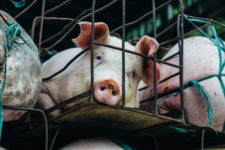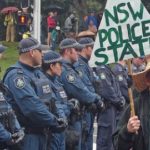NSW to Pass More Laws Aimed at Silencing Animal Activists

The NSW Liberal Nationals government is reinforcing its ever-broadening patchwork of ag-gag legislation, designed to block animal rights activists from exposing inhumane practices and specific incidents of cruelty occurring in this state’s farms and slaughterhouses.
NSW agriculture minister Adam Marshall gave notice on 20 August that his government has the intention of introducing the Right to Farm Bill 2019, which is set to contain the toughest penalties for farm trespass in the country.
The bill will include a first of its kind custodial penalty for farm trespass of up to three years imprisonment, as well as a fine of $22,000, which is up from $5,500. And the government will also be legislating a right to farm, which will protect farmers from legal action and nuisance complaints.
Despite no legislation being forthcoming as yet, Labor has said it will back the move, which comes just weeks after the Berejiklian government already beefed up ag-gag laws framed as biosecurity measures in relation to the draconian Biosecurity Act 2015 (NSW).
However, the animal activists targeted by these measures assert that while the Morrison government states these laws are needed due to rising actions against agribusiness, this isn’t the case. And the laws are rather a reaction to rising community concerns over cruel industry practices.
Hiding the harm
“The term ‘Right to Farm’ is an interesting, but sad attempt at framing,” said NSW Animal Justice Party (AJP) MLC Emma Hurst. “What about the right of the public to know how millions of animals are being treated behind closed doors in the animal agribusiness industry?”
“Punishing those who expose animal cruelty is not the answer,” she continued. “The community has a no tolerance stance to animal cruelty and will not support the NSW government’s efforts to hide it.”
The agricultural minister first spruiked the “right to farm” soon after the Berejiklian government returned to power. The Nationals member said he’d be introducing legislation that ensures activists will face prison time for “sabotaging and disrupting legitimate and genuine farming activities”.
The coming legislation will insert the new offences of inciting or causing trespass into the Inclosed Lands Act 1901 (NSW), as well as creating fresh aggravating factors, such as “trespassing in a group, damaging property and wilfully or negligently releasing stock”.
“Considering the bill seems to be trying to stop public awareness of animal cruelty,” Hurst added, “with an end goal of, presumably, slowing down the growing public discontent about the pain and harm occurring to animals, perhaps a more accurate term for the bill could be the ‘Right to Harm’.”
Rising public awareness
Ms Hurst told Sydney Criminal Lawyers that despite government assertions, there isn’t any pronounced increase in the number of animal rights actions being staged throughout NSW. And she should know, as she’s been active in the movement for the last twenty years.
“What we have seen though, is an increase in consumer awareness and public scrutiny on the way animals are being treated in the animal agribusiness industry,” she made clear. And she pointed to a recent report commissioned by the federal Department of Agriculture.
The Australia’s Shifting Mindset on Farm Animal Welfare report found that 95 percent of Australians view farm animal welfare as a concern and 91 percent want at least some reform around it. And the researchers posit that the gap between expectations and regulation is a problem for government.
But, as Ms Hurst points out, instead of “acting on this and creating reform”, the government is trying to “cover up the cruelty to stop” public scrutiny of cruel practices, many of which are legal, such as caging hens and pigs, and sending calves to their death as part of milk production.
These practices “are seeing consumers change their buying behaviours”, according to Hurst. And the laws are about “industry lobby groups” hoping to silence advocates to stop “conversations about animal cruelty”, in an attempt to slow or even reverse the growing trend away from meat and dairy.
Horrific, but legal
Animal rights organisations Aussie Farms and Animals Within released footage last week captured by a hidden body-worn camera that exposed cruel animal practices that are “completely legal” being carried out at Picton Meatworx, “a multi-species slaughterhouse south of Sydney”.
The footage “shows brutal acts of cruelty, including beating in frightened pigs’ skulls with mallets and leaving a traumatised calf to suffer a slow and painful death as he bleeds from a slit throat”, Ms Hurst related.
Aussie Farms released more footage on Wednesday. This time it shows dozens of male baby goats being bolt gunned to death and tossed into a bin. The farm in the Victorian town of Trafalgar produces milk and therefore, the male offspring without that ability are considered waste products.
“The government is pushing a political agenda to instil fear and silence members of society who expose animal abuse,” Hurst stressed. “This footage is one of many examples of exactly the type of practices the government is trying to hide” via the new NSW ag-gag laws.
Exposing the dark underbelly
Ms Hurst explained her party has tabled a disallowance motion against last month’s Biosecurity Amendment (Biosecurity Management Plans) Regulation 2019 (NSW), and she’ll be doing something similar if the Right to Farm Bill makes it as far as the upper house.
The long-term animal rights activist also said she’s been recommending that people watch the film Dominion online. Directed by Animal Farms executive director Chris Delforce, the documentary exposes “the dark underbelly of modern animal agriculture”.
And Delforce is well-aware of the effects of the nation’s ag-gag laws, as his Adelaide home was raided by a joint taskforce of NSW and South Australian police over publishing material obtained at agribusinesses in 2015. The case was eventually dismissed prior to the release of Dominion.
“Ironically, the more the government push for these laws, the more this movie is downloaded and watched,” Ms Hurst said. And “the increasing secrecy within the industry will backfire”, she warned, as media and the community are already asking what it is government is so desperate to hide.







